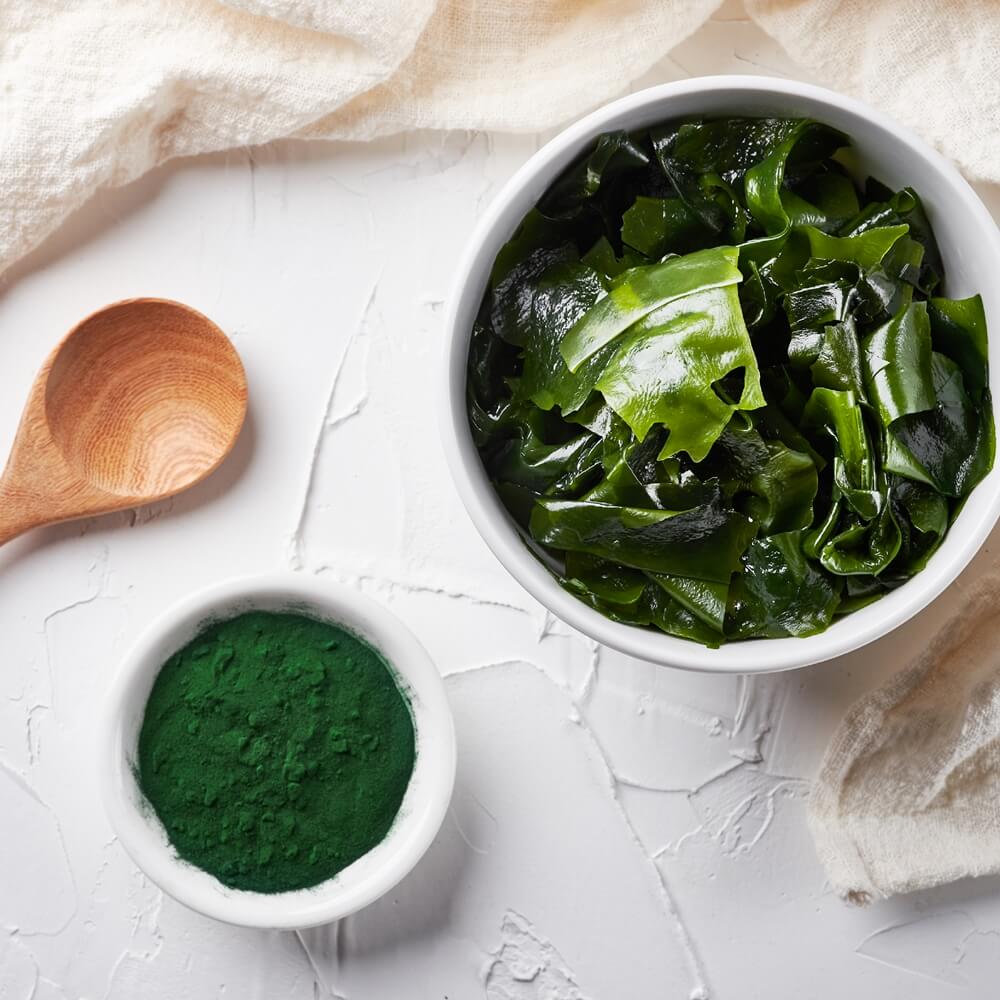
There exists a vast, largely unexplored world of plants in our oceans and seas that could hold answers to some of our most pressing health concerns. While we often turn to land-based solutions or synthetic alternatives, the rich diversity of marine extracts remains a relatively uncharted territory when it comes to revolutionizing aspects of health and well-being. From microalgae and algae-derived omega-3s to brown seaweeds like dulse, Salicornia, kelp, as well as red seaweeds like nori, the past decade has seen studies illuminating their promising results and offer an exciting frontier in wellness.
In this blog, I delve deep into the latest studies on marine extracts and their impact on health elements that support longevity, such as maintaining blood sugar balance, supporting heart health, nurturing long-term cognitive health, and enhancing gut health. There are also a few exciting studies on how seaweeds specifically impact longevity pathways and inhibit cellular senescence!
MARINE EXTRACTS FOR BLOOD SUGAR BALANCE
One of the most important goals when it comes to extending lifespan and healthspan is improving metabolic health. It’s so exciting when we find research-backed, time-tested, ways of getting our insulin levels balanced. Vegan marine extracts offer unique nutritional properties that help regulate blood sugar levels in several ways.
Much research has focused on the potential of brown seaweeds to positively impact metabolic health. Incorporating seaweed into the diet may be effective in preventing and managing type 2 diabetes by improving blood sugar control. In many studies, those who consumed seaweed have exhibited reduced post-meal blood glucose levels, lower HbA1c levels, and improved insulin sensitivity. This happens because the nutrients in seaweed significantly inhibit enzymes involved in digesting carbohydrates.
Targeting glucosidase activity is considered a useful approach for improving glycemic control. Brown seaweeds are often a rich source of antioxidants (e.g., fucoxanthin, astaxanthin) and polyphenols that help reduce oxidative stress and inflammation, which can be associated with insulin resistance and blood sugar imbalances. Additionally, kombu kelp, a variety of Pacific kelp referred to as “Kombu” in Japan, is a rich, natural source of glutamic acid, a precursor to the body’s primary antioxidant, glutathione. Elevated levels of glutathione play a significant role in enhancing insulin sensitivity and mitigating inflammation.
Vanadium, a trace mineral naturally occurring in kelp, can play a role in managing blood sugar levels as well. A study indicated that the daily recommended intake of vanadium has demonstrated its ability to help regulate healthy blood glucose levels in individuals with type 2 diabetes mellitus.
SEAWEED FOR COGNITIVE HEALTH

Seaweeds, especially brown species, have shown neuroprotective potential against diseases like Parkinson’s and Alzheimer’s. There are bioactive compounds in seaweeds with neuroprotective properties. Polysaccharides (complex carbohydrates composed of multiple sugar molecules) found in seaweeds, like phlorotannins in brown seaweeds, show exciting promise in promoting long-term cognitive health.
Several specific seaweed varieties are being researched for combating neurodegenerative diseases and preserving memory. Saccharina japonica, a type of brown seaweed, contains enzymatic hydrolysates that have shown anti-Alzheimer’s, anti-inflammatory, and antioxidant properties, making them potential candidates for creating new pharmaceuticals. The polysaccharides, phloroeckol and a tetrameric phloroglucinol from Macrocystis pyrifera may also have anti-Alzheimer’s effects. Ecklonia cava, an edible brown seaweed, is being explored as a therapeutic agent for Parkinson’s disease prevention due to the neuroprotective activity of dieckol, a polyphenol it contains.
Algae research has revealed that fucoxanthin, a pigment from different algae types, offers neuroprotective properties. Sea vegetables also contain a unique group of polysaccharides known as fucoidans. These fucoidans with their distinct branching pattern and sulfur-containing molecules, are under extensive research for their remarkable potential to attenuate neuronal cell damage, inhibit inflammation, and counter oxidative stress.
MARINE EXTRACTS AND PROTECTING HEART HEALTH
Seaweeds are renowned for their heart health-boosting benefits, thanks to their rich array of bioactive compounds like polyphenols and carotenoids. These natural antioxidants are associated with reducing oxidative stress and inflammation, both of which are significant contributors to heart disease. The fucoidans in seaweeds have been shown to reduce inflammation and potentially lower the risk of atherosclerosis, a condition characterized by the hardening of arteries. These fucoidans block selectin production and inhibit pro-inflammatory enzymes, making it harder for inflammation to establish in the body.
The heart-healthy benefits of seaweeds and algae extend beyond just antioxidants and anti-inflammatory properties. Some studies have even hinted at their ability to support healthy blood pressure, cholesterol levels, and blood vessel function.
There are more nutritional reasons marine extracts have positive effects on reducing the risk of cardiovascular diseases. Seaweeds contain heart-healthy levels of EPAs and DHAs that affect lipoproteins, blood pressure, cardiac function, endothelial function, vascular reactivity, and cardiac physiology, and have powerful anti-inflammatory and antiplatelet effects.
SEAWEED AND LONGEVITY PATHWAYS

Marine compounds from macroalgaes, extracted from various seaweed species, have exhibited remarkable effects on extending lifespan and improving health in animal models, including yeast and flies. Once again, fucoxanthin has shown its ability to extend the lifespan. Similarly, compounds like porphyran from red algae and polysaccharides from Saccharina japonica have also displayed significant longevity-enhancing effects.
At a cellular level, compounds like fucoidan, found in various brown algae, have demonstrated their prowess in rescuing cells from both replicative and stress-induced senescence. They reduce the activity of senescence-associated beta-galactosidase (SA-β-Gal), a key marker of cellular aging, and influence the expression of proteins associated with senescence.
INCORPORATING MARINE NUTRIENTS INTO YOUR DIET
Seaweeds are rich in iodine, which is an essential nutrient crucial for thyroid hormonal health. However, it is important to note that excessive iodine can be harmful. Seaweed can also absorb heavy metals, causing health issues. Thus, it is extremely important to know the source of your seaweed, especially when used as a supplement. Choose high-quality, reputable brands who can provide lab analysis for their products, including heavy metals testing.
If you want to incorporate more seaweed in your meals, here are a few ideas!
- Sushi Rolls (Nori Seaweed): Nori seaweed is the dark, paper-like wrap used in sushi rolls. Craft your own sushi rolls at home, filling them with a variety of fresh vegetables, lean proteins, and healthy fats.
- Seaweed Snacks: Discover roasted seaweed snacks, readily available in most health food stores and supermarkets.
- Salads: Add dried or rehydrated seaweed to your salads for a unique texture and flavor. Wakame and arame are two types of seaweed that work well in salads. Soak them in water until they are tender, then toss them with your favorite greens, vegetables, and a light dressing.
- Seaweed Broth or Soups: Use seaweed to prepare a mineral-rich broth. Simmer kombu seaweed in water with other flavorful ingredients like ginger, garlic, and mushrooms for a comforting and healthful soup.
- Seaweed Smoothies: For a nutrient-packed smoothie, blend a small piece of soaked kombu seaweed or kelp powder with your favorite fruits and vegetables.
- Stir-Fries: Incorporate soaked or dried seaweed into your stir-fry dishes. It pairs well with vegetables, tofu, or lean animal protein sources like chicken or shrimp.
- Seaweed Condiments: Try seaweed flakes or furikake, a Japanese seasoning mix that typically includes seaweed, sesame seeds, and other flavorings. Sprinkle them over rice, vegetables, or any dish you’d like to enhance with a savory, oceanic taste.
- Seaweed Wraps: Instead of using tortillas or bread, use large, blanched seaweed leaves like kelp or dulse as wraps for sandwiches or wraps. Fill them with your favorite fillings for a low-carb, nutrient-dense meal.
A few additional tips…
- Which Seaweed Should You Try: Take note of the type of seaweed you’re eating or supplementing with to match with the associated studied benefits.
- Dosage and Duration: Based on the studies referenced above, aim for a daily intake of seaweed exceeding 1000 mg, and be consistent with your consumption for at least 12 weeks to maximize the potential benefits on blood sugar control. Measure your blood sugar levels consistently for results and check with your healthcare practitioner to monitor and adjust.
- Diversify Your Diet: While seaweed can be a valuable addition, it’s essential to maintain a balanced diet rich in a variety of nutrients. Don’t rely solely on seaweed for blood sugar management; combine it with other healthy dietary choices.
- Hydration: Seaweed can be high in fiber, so be sure to drink enough water to aid digestion and prevent any gastrointestinal discomfort.
In conclusion…
In the vast realm of health and longevity, the potential of marine extracts, particularly seaweeds and algae, emerges as an intriguing and largely uncharted territory that holds promise for our well-being. From regulating blood sugar levels to safeguarding cognitive health against neurodegenerative diseases like Parkinson’s and Alzheimer’s, these marine marvels offer hope for a healthier, more vibrant future.
by





